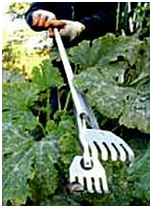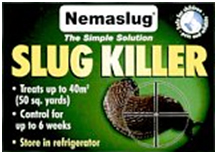Slugs & Snails
The battle against slugs and snails is one the gardener will never win. However, working with natural solutions, planting strategically, and encouraging wildlife, we can minimise the impact of the slug menace.
Finding ways of permanently putting the little blighters out of your misery! This method includes poisoning, which should be avoided unless absolutely necessary.
Ingenious contraptions to lure the slug to its doom; either killing it outright or allowing you to dispose of it later at your leisure. For example, the popular Slug-X beer trap.
Another variation on the slug trap idea is to recognise the sort of places where slugs love to hide during the day. Check those places and dispose of any slugs you find hiding there. You can even create your own such places in the garden and have the slugs exactly where you want them.
Rather than total annihilation, this approach aims to keep a little distance between the slug and your precious plants. Rough surfaces that are difficult to move across, desiccants that dehydrate, and copper barriers that inflict a tiny electric shock are just some of the possibilities.
 This is the more effective method of slug control; more so than any poisons and chemicals. You can collect hundreds on night time ‘slug patrol’ after a shower of rain. For a more elegant solution to manual slug collection, how about a slug grabber? Made from light-weight, anti-corrode aluminium; its 90cm (3’) length allows you to pluck slugs from the lawn with ease, and reach well into the border to pick them from plant leaves without stepping onto your garden.
This is the more effective method of slug control; more so than any poisons and chemicals. You can collect hundreds on night time ‘slug patrol’ after a shower of rain. For a more elegant solution to manual slug collection, how about a slug grabber? Made from light-weight, anti-corrode aluminium; its 90cm (3’) length allows you to pluck slugs from the lawn with ease, and reach well into the border to pick them from plant leaves without stepping onto your garden.
Natural Predators
Hedgehogs, birds, and beetles all love a fat juicy slug! Learn to encourage the ‘good guys’ to make your garden their home. Microscopic nematodes, while technically a parasite rather than a predator, fall loosely into this category too.
Nemaslug – nematode slug killer
The environmentally friendly alternative to traditional slug pellets; Nemaslug is the perfect choice for the ecological gardener who hates using chemicals and poisons in the garden. In fact, the nematodes are already present in smaller numbers in most soils, so you aren’t introducing anything new into your garden.
Simply mix the nematodes with water and apply to the soil – job done. Up to two month’s protection from a single treatment.
This is readily available (from Harrod Horticultural and others).
Garden Hygiene
An untidy garden with masses of dense undergrowth and rubbish beneath which to shelter during the day will provide a veritable slug haven. So keep it tidy! Slugs will hate you for it.
Slug Tolerance
Last but not least is learning to live with the slug to a certain extent. Grow the most delicate plants away from favoured slug haunts. Consider a few sacrificial plants to lure them away from your tender seedlings and treasured specimens.
Slug pellets should be used as a ‘last resort’, although they’re often the gardener’s first (and only) resort. When using chemicals in the garden, ALWAYS read the label carefully. Keep any poisons away from children and animals.
Handy hint
As with all hazardous substances, always keep slug pellets well out of reach of children, and securely sealed in their containers.
